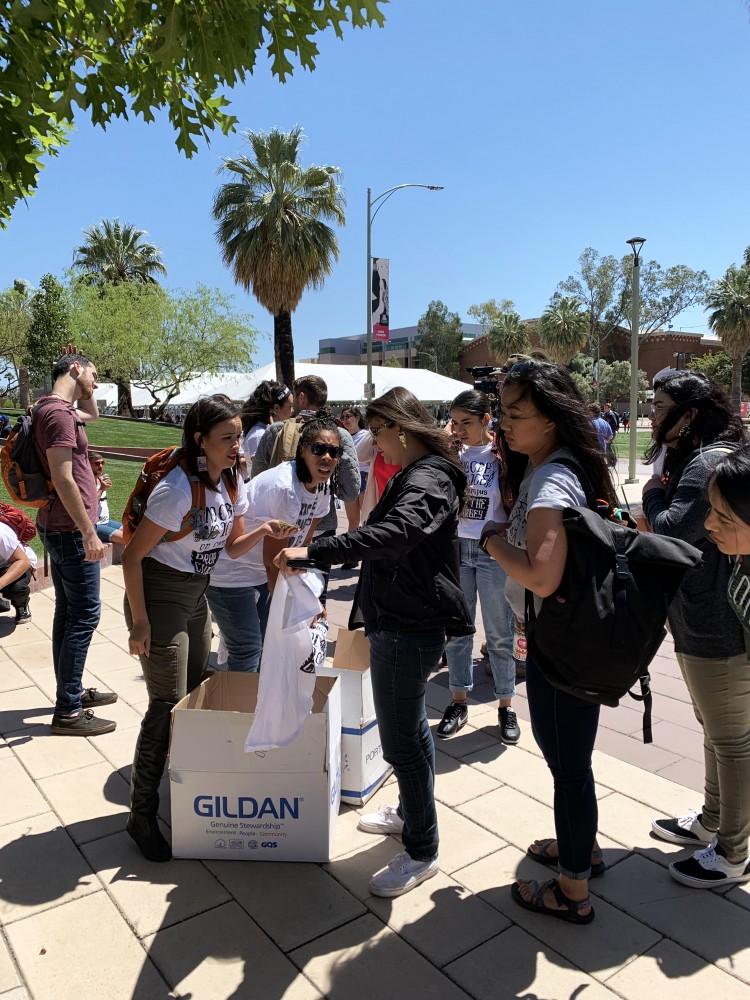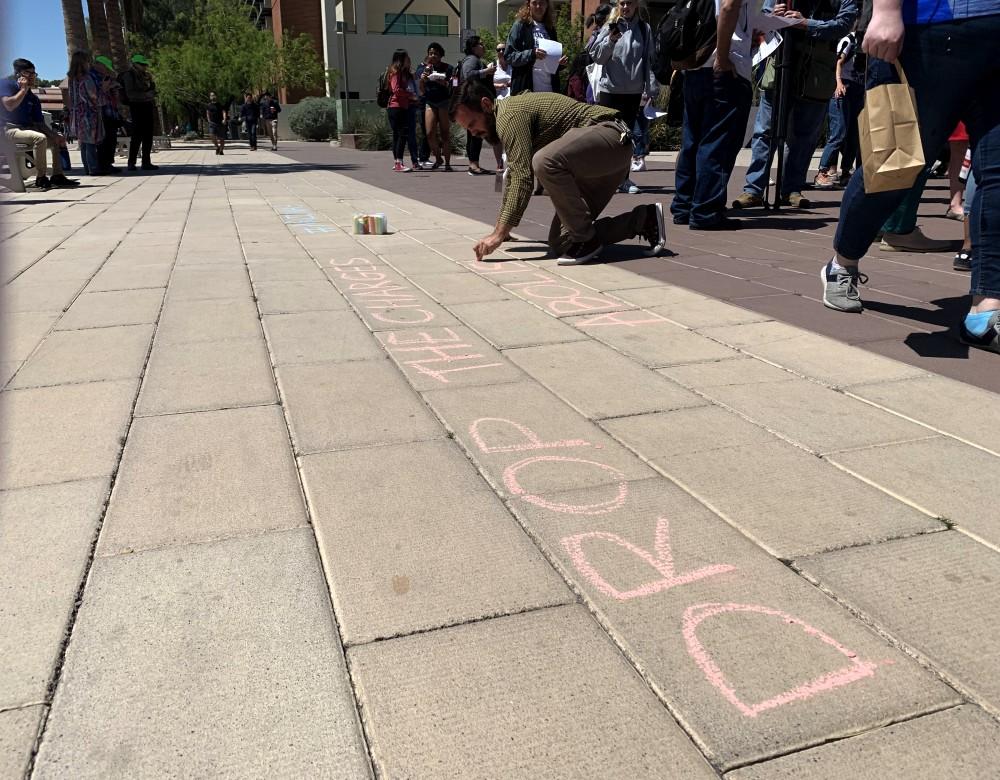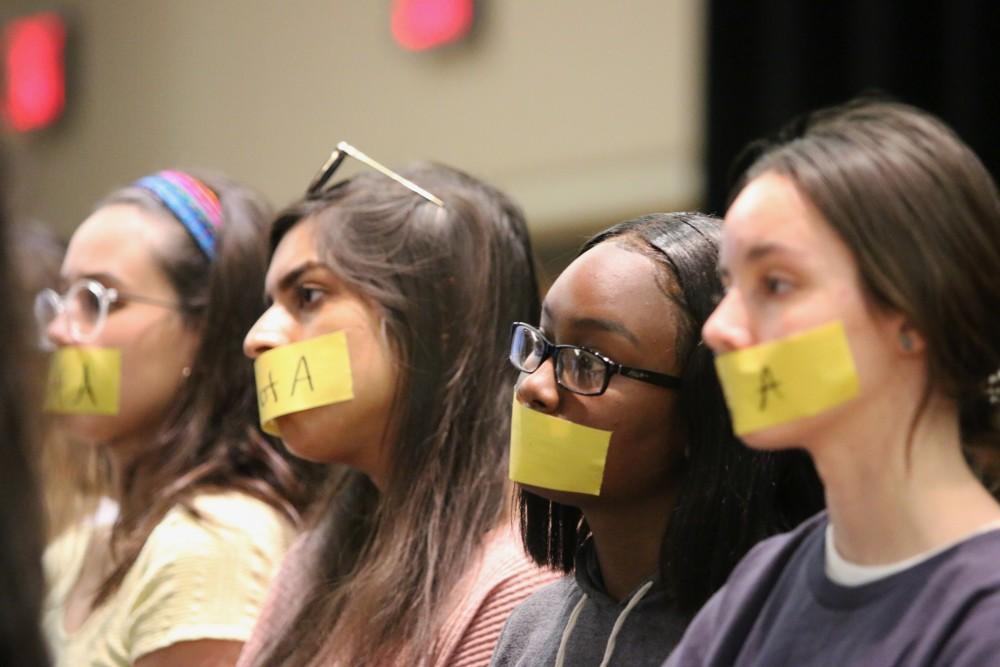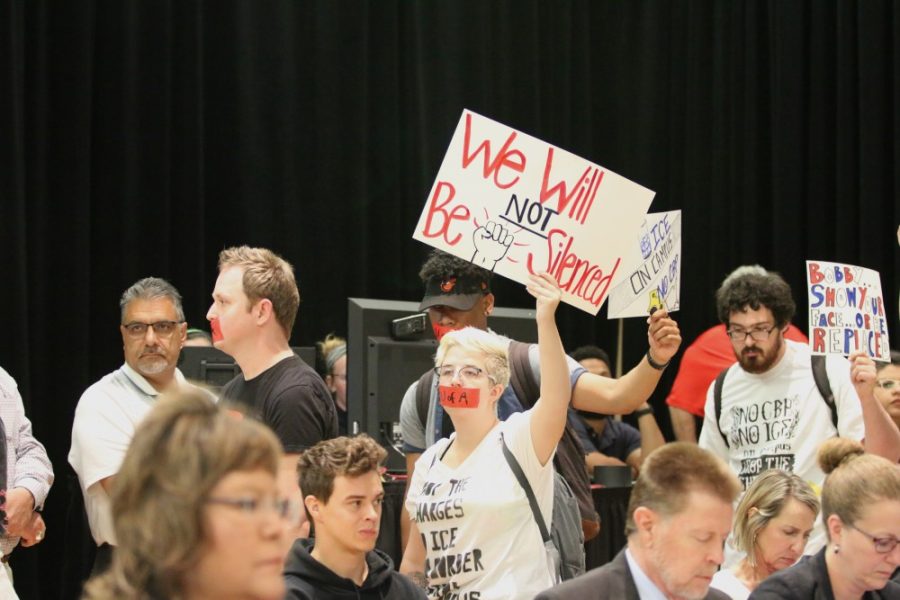The Coalition for the “Arizona 3” gathered on Freedom Hill today at 12:45 p.m., an hour before the Arizona Board of Regents meeting commenced in the Grand Ballroom of the Student Union Memorial Center. They then attended the meeting, where three students addressed the board and expressed their outrage and outlined their demands.
The Coalition is a group of student and community members which supports the three students criminally charged in the Border Patrol incident and demands the charges be dropped.
RELATED: Protesters leave letters of support for ‘Arizona 3,’ demand action from Robbins
Students planned to address the regents concerning different topics that all have to do “with getting these agents off of our campus,” according to Fernando Najera.
Najera, a law and political science student at UA and an organizer that addressed the crowd on Freedom Hill, said he is a DACA recipient himself.
“In solidarity, we will be filling that space up, taping our mouths to symbolize the silencing that they have done onto these women and also pay honor to the ethnic studies fight,” Najera said. “They used the same tactics to silence the TUSD, and likewise, we are honoring their fight now.”
Najera stated the coalition’s primary platform is to ban Immigration and Customs Enforcement and Customs and Border Protection agents from campus.

Najera referred to the actions that occurred on March 19 and the greater implications they have on the community.
“The three women who spoke out against Border Patrol elevated an issue that has been going on for so long,” Najera said to the crowd. “Along this region, Border Patrol have been terrorizing native people, terrorizing black and brown bodies. It is enough, right?”
Following Najera’s statement, Jessica Rodriguez, a UA student, lead the crowd in a series of chants.
Margarita Ruedas, a media liaison for the coalition and a UA student of family studies and human development, spoke on the purpose of the day’s demonstration.
“This isn’t the first conversation we’ve had with administration regarding Border Patrol and ICE on campus, so it’s not something that’s necessarily new to us. It’s a conversation that we have to continue to have, and we’ve been having it for decades,” Ruedas said.
Participants in the protest were given the option to purchase white T-shirts reading “No CBP No ICE on campus. Drop the charges.” According to Ruedas, profits from the sales will be used for purchasing future supplies.

During the regents’ meeting
The demonstrators began to line up before the board meeting. Najera led the silent demonstration up the stairs and into the North Grand Ballroom of the SUMC, where the meeting was scheduled to begin at 1:30 p.m.
The protesters filed into the ballroom at around 1:15 p.m. All available seating was quickly filled, with many protesters standing inside the ballroom and dozens of others outside.
The ABOR meeting proceedings began with the Pledge of Allegiance. The coalition stayed seated for the duration of the pledge.
RELATED: Students and staff hold protest in support of ‘Arizona 3’
During the call to the audience portion of the meeting, the board paused and announced they would be delaying the continuation of the meeting in order to reconfigure the room to allow additional community members inside.
The room was initially set up for a capacity of 220 people. After a wall was moved, space was created for 140 additional attendees. The call to the audience continued after the changes were made and more protesters were allowed in.

Three students addressed the regents with concerns related to those raised by the coalition.
The protesters stood while student and ASUA Senator-elect Ana Mendoza, student Mira Patel and student Denisse Moreno Melchor spoke. Moreno Melchor was one of the students criminally charged and thus a member of the “Arizona 3.”
“You have failed me as a Latina who attends a Hispanic-Serving Institute,” Mendoza said to the board.
She also said she is afraid to attend class and has missed two weeks of school due to this fear. She calculated this has cost her over one thousand dollars.
Patel stated she should be worrying about class, not addressing the board, but because of the administration’s actions she had to return to speak to the board for a third year. She stated the coalition’s three demands: the charges against the three students be dropped, ICE and CBP be banned from campus and President Dr. Robert C. Robbins resign, should these demands not be met.
The final student to speak was Moreno Mechor. She repeated the demands.
The protesters responded to each student’s speech with applause.
After the call to the audience ended, the protesters left the board meeting, leaving the previously packed room much emptier than before.
Efforts going forward
Media liaisons were made available during yesterday’s protest. The coalition added police liaisons to their representatives today. ASUA President Natalynn Masters was present outside the SUMC prior to the ABOR meeting, speaking with the coalition.
“Having protests occur is the best example of student empowerment,” Masters said. “And so I am in full support of students exercising their First Amendment right.”
As president of ASUA, Masters has stressed the importance of student government to the entire student community.
“I think, a lot of the times, it takes things like this and protests to happen for real change on university campuses to happen – real change on a university to happen. I fully support anything that students do to help bring attention to better support our communities on campus,” Masters said.
She encouraged them to keep going.
“Do not give up, one of the biggest things for communities of color or marginalized identities is that it’s very draining to constantly be an advocate and fight for change,” Masters said.
RELATED: Third student arrested for Border Patrol incident after watching traffic accident
Masters confirmed unofficial conversations have occurred between student government and UA Administration regarding ICE and Border Patrol on campus. Masters also mentioned her initiative to raise scholarship money for DACA students from the annual benefit dinner.
“Their actions are not going unnoticed,” Masters said. “It’s really important for students to understand that this is necessary in order for the university to be better, and I applaud them for their work.”
ASUA began research on how other Universities provide services to DACA students. Masters said she plans to review other institutions’ plans and see how they can aid the discussion about Border Patrol and ICE presence on campus.
Follow the Daily Wildcat on Twitter









